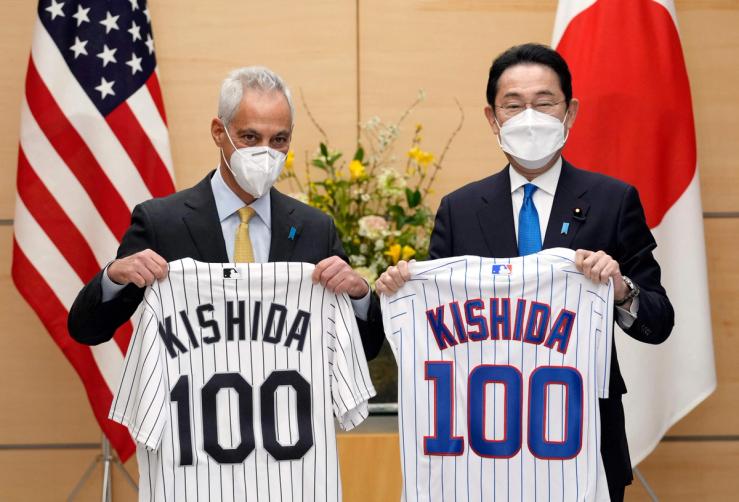The News
TOKYO, Japan — The legendary American political brawler Rahm Emanuel — precocious Bill Clinton aide, Democratic Congressional Committee Chairman, Barack Obama chief of staff, controversial Chicago mayor — is halfway around the world from the 2024 election, having traded American politics for a post as perhaps President Joe Biden’s most important emissary to Asia.
I met Amb. Emanuel last Wednesday over coffee at the U.S. ambassador’s residence in Tokyo’s Akasaka neighborhood. There, he’s working to fortify critical U.S. regional alliances as a counterweight to China, only occasionally picking fights on Twitter, and for the first time in his adult life, missing out on a grueling American election year.
So I asked the obvious question: Does he wish he were back in Washington helping steer the president’s reelection campaign?
“The honest answer is yes and no, with probably an emphasis on no,” Emanuel said.
We met between his meetings with Biden’s climate envoy John Podesta and members of Japan’s legislature, the National Diet.
“I find the work incredibly intellectually stimulating and there’s not a day that I sit up there with my feet up and I go, what do I do now?” Emanuel said. “On the other hand, I love politics and you watch what’s going on and you know what you would do … you have your own energy and own thoughts. But it’s not like I’m going anywhere.”
In this article:
Know More
Emanuel’s work is still intimately connected to the daily happenings in Washington, especially as the White House readies for next month’s state visit for Japanese Prime Minister Fumio Kishida.
From Tokyo, Emanuel is also trying to increase pressure on Congress to pass a stalled foreign aid package, which includes funding to help Ukraine fight Russia’s invasion as well as support for Israel and U.S. allies in Asia. He helped organize a letter to congressional leaders earlier this year warning that U.S. credibility is on the line.
“I know some people have used the excuse, ‘Oh, we should focus on Asia.’ Well, Asia is very focused on what America is going to do in Europe, because if we’re not going to follow through, nobody is going to follow us in Asia,” he told Semafor.
Emanuel referenced the trilateral dialogue formed last year that saw Japan and South Korea put aside longstanding differences to work together with the United States. “That was China’s worst day,” he said. But he warned it wouldn’t have been possible if allies were questioning America’s reliability.
“To get Korea and Japan to go the extra distance, to find a new common ground and to find a new future, you have to have trust in America,” he said. “You don’t have trust in America, you’re not going to stretch.”
(I spoke with him hours before Biden would come out publicly against a proposed acquisition of U.S. Steel by Japan’s Nippon Steel Corp., a rare point of tension in the bilateral relationship.)
Emanuel is at the tip of the spear of the Biden administration’s efforts to counter China in the region. He touted the administration’s development of a nuclear powered submarine pact with the U.K. and Australia, AUKUS, and efforts to strengthen the Quad, as his proudest examples.
“There is no country in the region that China is not having some form of — I wouldn’t say conflict in the way that you think of Ukraine — but heat,” he said.
“China has done its level best to help the United States and our allies wake up and realize what we have to do. And I think President Biden has taken full advantage of China’s repeated mistakes.”
That’s not to say he hasn’t made his presence known with the kinds of goading gestures he’s known for in domestic politics. Last year, he needled China with a post on X mocking a series of top officials who suddenly went missing before their ouster was later revealed. The messages reportedly attracted pushback from the White House, which was trying to foster civil dialogue between Biden and Chinese leader Xi Jinping.
“All I said was where is this guy? You have 400 nukes. You want to be a responsible superpower. Don’t you think maybe you should tell people where your secretary of defense went?” he said. “There seems to be an explicit effort by China to not be honest and forthright with anybody else.”
Emanuel denied he’d toned down his approach in response to concerns his social media posts might unnecessarily provoke China, whose own U.S. ambassador accused him of “seeking limelight for oneself” with his rhetoric.
“If I got pushback, how effective has it been? Have I stopped saying anything?” Emanuel said, taking issue with Semafor’s description of the tweets as “critical” towards China. “It was truthful. China said that the United States armed forces created the fires in Hawaii. Truthful or not? Not truthful. China has said that the United States armed forces created Covid. Not truthful. China said that neither Lithuania, Latvia, or Estonia are real countries. Not truthful. What I said is that the minister of defense had gone missing. Truthful.”
Morgan’s view
Emanuel has made his mark on Tokyo in a way that has surprised some people there. During my recent visit, officials and experts stressed to me how engaged he is in his role, with some describing him as well-liked — no small feat for a man President Obama once joked was made “practically mute” when he lost part of his middle finger in an accident. Japanese officials, for instance, saw Emanuel’s announcement that the U.S. military would purchase Japanese seafood in response to a Chinese ban as an important signal of support.
Akihisa Nagashima, a member of Japan’s House of Representatives in Kishida’s Liberal Democratic Party, described Emanuel to me as “very, very aggressive.” He cited Emanuel’s work lining up allies in the region against Russia, as well as his public support for Japan’s law addressing anti-LGBTQ discrimination that drew ire from conservatives.
“I think he is the most active ambassador in history,” he said.
Yasushi Watanabe, a professor at Keio University who focuses on U.S.-Japan relations, told me he was pleasantly surprised to see Emanuel reaching across the political aisle — he cited a recent meeting between the ambassador and Arkansas Gov. Sarah Huckabee Sanders, Donald Trump’s former White House press secretary — despite his “partisan” background.
Emanuel really does seem to be embracing his diplomatic role. During our interview, he enthusiastically offered his vision for a new U.S approach to alliances in Asia. Emanuel argued the U.S. is moving from a “hub-and-spoke system” to a “lattice-like” approach that sees more partnerships involving more countries — not only the U.S. working with allies on a bilateral basis.
“We all grew up with this: United States-Japan, United States-Korea, United States-Australia, United States-Singapore,” he told me. “I really do believe we’re going to wake up in like a year and go, what the hell just happened?”
At the same time, he hasn’t abandoned his politician’s instincts. Emanuel also rides the subway in Japan and pops up at local bars, Watanabe said. “That gives us the impression that unlike Amb. Kennedy, who was so much up in the sky, he is more down to earth,” he told me, referring to Caroline Kennedy, who served as Obama’s ambassador to Japan.
His reputation in Tokyo is an asset for the Biden administration, which wants to keep Asia the long-term priority even as the U.S. grapples with conflicts in Europe and the Middle East.
U.S.-Japan relations have grown stronger in recent years, buttressed by newer arrangements that also bring in South Korea and the Philippines.
That doesn’t mean there aren’t some disagreements between the U.S. and Japan. Biden recently publicly opposed the proposed acquisition of U.S. Steel by Nippon, while the deal is undergoing a U.S. national security review. Nagashima, the Japanese lawmaker, acknowledged the challenging politics of the acquisition for Biden but said he was hopeful for a decision “after the presidential election, maybe next year.”
The U.S. also wants Japan and other allies to step up curbs on China’s access to semiconductor technology.
But, Emanuel told me, “we don’t have a single issue today that throws sand in the gears.”
The View From China
China’s state-backed newspaper, the Global Times, accused Emanuel of being “anti-China” and “driving a wedge between China and Japan” in an editorial earlier this year.
The reporter of this story traveled to Tokyo through a program run by the Foreign Press Center Japan, a nonprofit, independent organization whose funding sources include the Japanese government and other private organizations.


